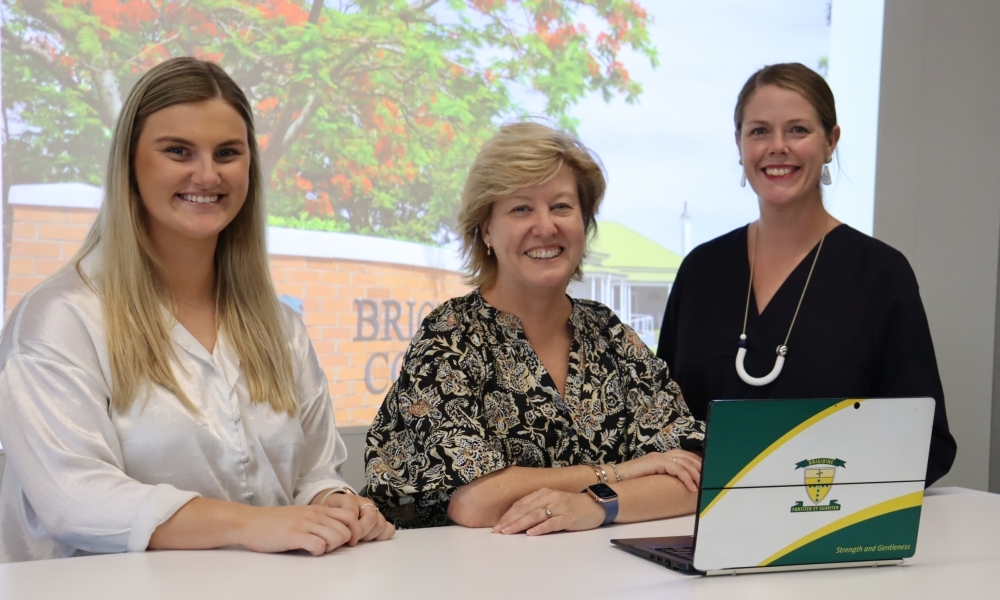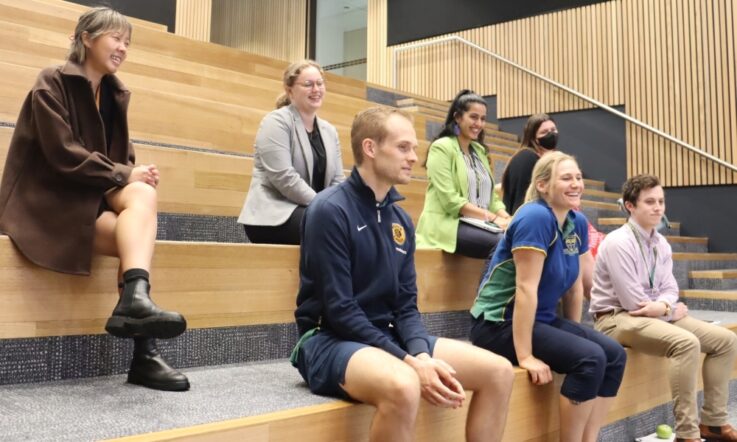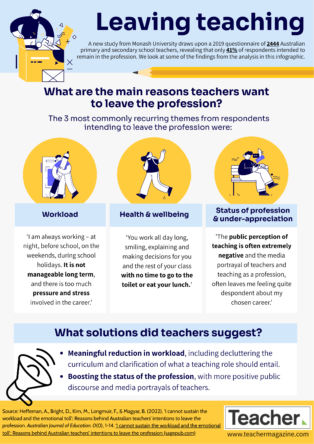In the first part of our school improvement Q&A with Allison Johansen (Assistant to the Principal, Professional Teaching and Learning) we heard how reflections on a professional learning summit and educator consultations led to a new approach to supporting and retaining pre-service and early career teachers at Brisbane’s Brigidine College, Indooroopilly (BCI). In this second part, she shares details of the Pre-Service Teacher Fellowship Program and its positive impact.
After consultations with range of educators, the Pre-Service Teacher Fellowship Program was created. How does this program work and who is involved?
Our program is one based on the needs of the pre-service teacher and it is part of our Professional Learning Program. It is quite flexible. We ask for applications in the last quarter of the year. This allows for time to review applications, interview and induct when successful. We advertise through our affiliated universities – University of Queensland, Queensland, University of Technologies, Australian Catholic University and the University of Southern Queensland – and through our social media and LinkedIn channels.
We ask those who are entering into their final year of their degree/masters to apply. This allows us to view their practicum report and gauge their tenacity. The induction program occurs during December, allowing them to visit to our campus, meet their mentor teacher and receive a likely plan of the classes to be taken the following year, as well as understand general day-to-day requirements, such as where to park, eat, sit, and the following year's calendar of events and routines for the Professional Learning Week during Staff Week, prior to students arriving on campus. This induction takes several hours and contains both face-to-face elements as well as online modules to support the success of the program.
Fellowship students are set up on our systems, giving them access to our Learning Management System, access key cards, College laptop if required, College email and so on.
The following year, on the first day back for staff, our Fellowship students arrive and shadow their mentor teacher, including attending the College Principal's welcome address and key messages. The professional learning schedule is then observed for the remainder of the week containing mandatory learning such as student protection and professional learning tied to the strategic direction of the College, professional learning based on an individual's needs, department collaboration time and spirituality learning and reflection.
During this week, teachers plan for the return of students, and their learning and health needs. Our transition to high school/new school program is also initiated at this time, welcoming new young people to our College and campus. The start of the year is important for establishing friendships and helping students to find their tribes and sense of belonging. Our teachers play a key role in this and other areas, including immunisations, swimming carnivals, and school camps, as well as establishing relationships with parents and carers, assessing student prior learning, ACER PAT testing, assemblies and so on. Teachers are also involved in our Early Career Teacher (ECT) program.
I’m sure things are continuing to grow all the time. Have there been any changes and tweaks to the program along the way?
We changed the program in 2022 to employ Fellowship Pre-service teachers as aides in the College – around their university timetables and practicum placements. This has benefits twofold. One, the pre-service teacher spends more time in classrooms, observing different classes, teachers, age groups, and levels of support required; secondly, the College employs aides who have training in learning needs, and who are able and willing to take on extra hours to be the extra person on excursions, camps, and outside of hours College events where supervision is needed.
We have increased the flexibility of the program. Previously, we had a suggested timetable (like university), suggesting how much and when pre-service teachers should teach. We removed this during the first year to ensure the flexibility of the program. This has allowed Fellowship pre-service teachers to cater to the needs of their families better – for example, dropping their own children at school and start after our first class, and leave before the end of the day to retrieve their children.
We ensure we maintain their accounts at the College to allow for them to return during the year for further professional development, First Aide training and College events such as the Christmas lunch.
We also employ them at the end of the year over the Christmas holidays to do marking for our College standardised test – this gives them income over the holidays, and is done on their personal laptops prior to the school year starting.
What has the impact of this program been for the pre-service teachers and for the members of staff working with them?
Our Fellowship Pre-service Teachers leave our program feeling confident and capable to walk into the classroom the following year and establish their own classes from the beginning of the school year. They have also practised how to build relationships with mentors and staffroom colleagues, which is a difficult skill to learn.
Here are some of the feedback responses we’ve received from pre-service teachers:
‘I feel so much more confident going into teaching. It's amazing how much I have grown as a professional in the six weeks I have been here. It has given me not only belief in my ability, but the tools and strategies I will need for a professional space. I loved the opportunity to be part of the PLCs and the development of the team's goal and data collection. I am hoping to continue with this team throughout the year, as this has given me a great insight into learning analytics but also what we can do for our students. You don't learn these sorts of things in university, so this has been so valuable. I also have been able to track students’ progress and develop an understanding of PAT test data, NAPLAN, and grades to get an understanding of where we can help that student achieve their personal best.’
‘All teachers have been very welcoming and supportive during my time. One teacher found me a class to observe when she noticed me sitting at my desk during a spare. My Curriculum Middle Leader checks in and makes sure I am going well with my lessons. Colleagues (who I sit next to in the staff room) regularly check in on how I am going. My mentor teacher has been very supportive and helpful, always answering my questions and guiding me through the lessons.’
‘I was welcomed warmly into the staffroom and felt comfortable asking any member of staff for assistance when needed. I was checked on multiple times throughout the program to see how I was going and felt included as a member of staff. Receiving a desk for my time here was a gesture I really appreciated, in all my pracs I have never had somewhere to use as my own space. I was very sad to leave on my last fellowship day, which is a true credit to the warmth and encouragement I received.’
For our mentor teachers it has been a chance to share their expertise and practice with the next generation of teachers, welcome them to profession and provide them with advice and support. Here are some of the feedback responses we’ve received from mentor teachers:
‘The program feels much like an extended practicum module. The student teacher could learn at a more relaxed pace. She could teach fewer lessons than in her prac, allowing her more time to prepare well and giving me more time to give thorough feedback. It also allowed more time for her to practise setting and moderating assessments and to get involved in the more pastoral aspects of school life.’
‘They were able to experience the first days of school: most pre-service teachers are not present at school to be able to experience the establishment of classroom routines. They also got a better understanding of the requirements about school policies, professional development and preparation that is required to be a Graduate/Proficient teacher. My pre-service teacher was also able to experience planning and teaching one subject for every lesson across three weeks – this was done on a voluntary basis, but she showed initiative and after a trial she demonstrated the capacity to plan and facilitate a lesson sequence. She has then gone on to plan out the rest of the unit as if she was to stay and teach it herself. I believe this to be an all-round valuable experience going into final practicums and then moving into the workplace next year.’
In the first part of our Q&A, you recalled some of the questions for reflection that prompted the change were: Did our current way of supporting pre-service teachers work? How did we know? What evidence did we have to support this? Now that this new program is up and running, how are you continuing to monitor its effectiveness?
Each year we survey our Fellowship pre-service teachers and mentor teachers. From this, we celebrate our successes with the College, and look for ways to further improve the program for all parties. The Fellowship Pre-service Teacher program has been so successful that we employed one participant as a 'Permission to Teach', and then permanently thereafter. Participants are often offered permanent full-time employment before they have finished their university course; they are highly sought-after professionals.
As a school leader, what are the challenges you face in recruiting and retaining staff? Support available to staff feeds into successful recruitment and retention strategies. How do you support pre-service and early career teachers? Do you gather feedback on the effectiveness of the programs available?



